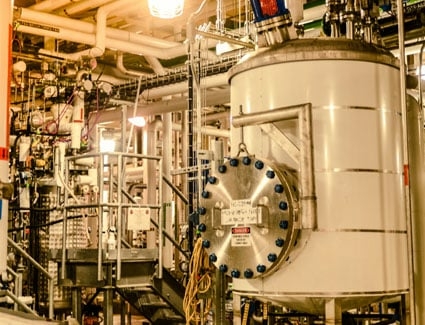Water woes, from lead pipes and nitrates to too little water, aired in Nebraska Legislature

LINCOLN — Lead in water service lines to older homes in Omaha.
Nitrate levels too high in rural and community water wells.
And not enough water to service expansion of the growing biotech campus in Blair.
Water woes aplenty were aired Monday at the Nebraska Legislature, with several senators seeking state funds to address them.
$300 million expansion possible
Blair officials joined with State Sen. Ben Hansen to seek $30 million in funding to help it and similar cities expand their drinking water supplies.

Hansen said a “fallout of the success” of the massive Cargill/Novozymes corn-processing campus in Blair, which provides 2,000 jobs, has been the need for additional water.
Right now, Cargill contracts for 15.5 million gallons of water per day from Blair’s water system, which has a capacity of 20 million gallons a day and supplies water to about half of Washington County.
But the Missouri River community north of Omaha is being eyed for a $300 million expansion of the biotech campus, which would bring another 300 good-paying jobs. The expansion will require another 7 million gallons of water a day, Blair officials said.
Blair Public Works Director Al Schoemaker said the community of 7,800 is seeking state help to keep its water rates low so the expansion project chooses Blair, rather than locations in Fort Dodge, Iowa, or South Dakota.
“We need to keep our water rates as competitive as possible,” Schoemaker told members of the Legislature’s Appropriations Committee.
Revolving loan fund
Under Legislative Bill 672, proposed by Hansen, a $30 million revolving loan fund would be set up through the Nebraska Department of Environment and Energy to help communities expand water systems. Up to 50% of the loan could be forgiven.
Schoemaker said inflation and supply-chair issues have escalated the cost of the water expansion project in Blair to about $44 million, with the city hoping to obtain $18 million from a state loan fund.
Fees paid by Cargill would repay the loan costs, he said.
The project includes installing a new intake from the Missouri River to handle new, lower flows during the winter, Schoemaker said.

State Sen. Christy Armendariz of Omaha questioned why the state needed to provide funds to attract the business expansion.
“I feel like we’re paying people to come here,” Armendariz said. “Maybe we shouldn’t blink first when negotiating.”
Hansen said that in luring the $300 million expansion, it’s not a question of “blinking first” but “who’s going to help them more.”
The other water bills presented to the Appropriations Committee were:
LB 613, from Omaha Sen. Mike McDonnell. The bill would transfer $45 million from the state’s cash reserve to help owners of older homes, mostly in eastern Omaha, afford costly replacement of lead service lines.
The work costs an average of $8,000 per home, with about 16,000 homes east of 72nd Street, built prior to 1940 and mostly in low-income neighborhoods, requiring replacement of lead service lines that extend from city water mains to homes.

Metropolitan Utilities District officials said their current replacement program is reaching only 200 homes a year, so LB 613, coupled with an expected $140 million from President Joe Biden’s Inflation Reduction Act, would significantly accelerate the work.
Replacing lead pipes is a major goal of the IRA. Lead poisoning has been linked to health problems in children, including reduced IQs and hyperactivity.
Reverse osmosis systems
LB 766, introduced by Niobrara Sen. Barry DeKay. As amended, it would provide about $3.3 million to expand a state program that grants funds for installing reverse osmosis systems in residences with nitrate levels of higher than 10 parts per million.
DeKay said the systems cost between $500 and $5,000 each.
Last year, the Legislature allocated $4 million for such reverse osmosis systems, but the committee was told Monday that applications only began in January and only 25 have been received so far.
LB 571, from Central City Sen. Loren Lippincott. The measure would provide $750,000 a year to operate a state well inspection program that was transferred to the NDEE from the Nebraska Department of Health and Human Services.
Advocates said the program is essential for keeping surface water from contaminating groundwater, through improper well installations. Gov. Jim Pillen allocated $635,000 for the program, which had been operating with about $1 million a year in funding, senators were told.
LB 534, sponsored by Sterling Sen. Julie Slama. Up to $150 million in American Rescue Plan Act (ARPA) funds would be allocated to help smaller communities dealing with high nitrates in groundwater to upgrade their water systems.
Slama said she expects that some ARPA funds allocated by the Legislature last year will be turned back, and that money could be used to help communities provide clean drinking water, which she said is “a right.”








